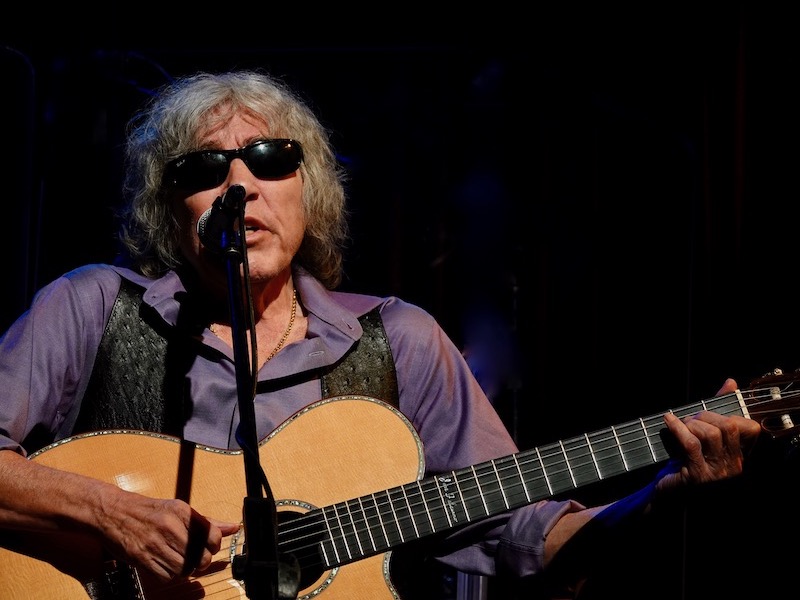
JOSE FELICIANO
June 27, 2023
Doors: 7:30PM / Show: 8:00PM
Buy Tickets$64-$109
June 28, 2023
Doors: 7:30 PM / Show: 8:00 PM
Buy Tickets$64-$109
June 29, 2023
Doors: 7:30 PM / Show: 8:00 PM
Buy Tickets$64-$109
FELICIANO: A Name That is Synonymous with MUSIC.
It is synonymous with an international presence that has influenced popular music for more than two generations. It is synonymous with a presence that has bridged musical styles in a way that has never been equaled. Jose Feliciano is recognized as the first Latin Artist to effectively cross over into the English music market, opening the doors for other artists who now play an important role in the American music industry.
As importantly, Feliciano has been acclaimed by critics around the world as “The greatest living guitarist.” Referred to as “The Picasso of his Realm,” Jose Feliciano’s accomplishments are highly celebrated. He’s been awarded over forty-five Gold and Platinum records; he has won nineteen Grammy nominations, earning nine Grammy Awards, including the “LARAS Award for Lifetime Achievement.”
Jose Feliciano’s musical career has been immortalized with a Star on Hollywood’s Walk of Fame. New York City has honored him by re-naming Public School 155 in East Harlem, “The Jose Feliciano Performing Arts School.” The Equestrian Order of the Holy Sepulchre, an ancient and prestigious Papal Order of the Catholic Church has knighted Jose at Saint Patrick’s Cathedral and he’s received a Doctor of Humane Letters degree from Sacred Heart University in Fairfield, Connecticut, for his musical, as well as humanitarian, contributions to the world.
Guitar Player Magazine has awarded him “Best Pop Guitarist,” placing him in their “Gallery of the Greats,” and he’s been voted both “Best Jazz” and “Best Rock Guitarist” in the Playboy Magazine reader’s poll, as well. In 1996, Jose was selected to receive Billboard Magazine’s “Lifetime Achievement Award.”
Continuing to be constantly in demand, Jose has performed for and with some of the most important people on Earth. He’s enjoyed playing with many of the top symphonic orchestras including the London Symphony, the Los Angeles Philharmonic and the Vienna Symphony Orchestra. He’s appeared on major television shows worldwide; he has done a number of his own specials and his music has been featured on television, in films and on the stage.
Jose was born blind, to humble beginnings, on September 10, 1945, in Lares, Puerto Rico. One of eleven boys, his love affair with music began at the age of three when he first accompanied his uncle on a tin cracker can. When he was five, his family immigrated to New York City. Young Jose learned to play the concertina at age six, using a handful of records as his teacher. At eight, he entertained his classmates at PS 57, and at nine, performed at The Puerto Rican Theater in the Bronx.
Venturing beyond the accordion, he taught himself to play the guitar with undaunted determination and again, with nothing but records as his teacher, practicing for as many as 14 hours a day. Exposed to the Rock’n’Roll of the 50’s, Jose was then inspired to sing.
At 17, Jose quit school. His father was not working at the time and he needed to help his family. He starting playing in coffee houses in Greenwich Village and for his salary — as was customary during that time in small clubs — they’d “pass the hat.” He played in coffee houses, clubs and cafes from Boston to Cleveland to Detroit, Chicago and Denver. A music critic from the New York Times, reviewing his performance at Gerde’s Folk City, referred to him as a “10-fingered wizard who romps, runs, rolls, picks and reverberates his six strings in an incomparable fashion.” He added, “If you want to witness the birth of a star, catch Mr. Feliciano before he leaves tomorrow night.”
Around this time, Jack Sommer, an A&R executive from RCA, went to the Village to audition a trio who was there, saw Jose perform and signed him to RCA, instead. This was, indeed, the Birth of a Star.
Jose’s first major break in the industry, however, happened in the Spanish market when, in 1966, after a spectacular performance at the Mar del Plata Festival in Argentina, the RCA executives in Buenos Aires encouraged Jose to stay and record an album of Spanish music. “They really didn’t know what to do with me in the studio,” Jose recalls. “So I suggested that we record a number of old boleros–songs I’d heard from the time I was a kid.” Feliciano’s interpretation of the classic bolero of the time was nothing short of amazing. The first single, “Poquita Fe,” was a ‘smash’ hit and “Usted” was even bigger.
Jose had taken long-time standards, torch songs from another era, and made them brand new. He re-worked and re-fashioned them with his signature acoustic guitar style and his vocal inflections of jazz and the American influences that he’d acquired during his adolescence. The formula clicked and Jose quickly became a “teen idol,” unable to pass through airports or leave his hotel room without a riot.
Two more albums followed in similar fashion and the name “Jose Feliciano” was known all throughout South and Central America, Mexico and the Caribbean.
Back in the States, RCA execs in Los Angeles assigned him to staff producer, Rick Jarrard. Rick closely studied Jose’s intriguing style and recommended that he record a Doors’ song that he’d heard him perform in concert — a tune called, “Light My Fire”…By the time he was twenty-three, Jose Feliciano had earned five Grammy nominations and won two Grammy Awards for his album “Feliciano!” He had performed over much of the world, and had recorded songs in four languages. But Jose was not satisfied. He had a desire to expand his career to include some acting and during the next few years, had made a number of dramatic TV appearances, including an episode of “Kung Fu,”“Macmillan and Wife” and “Chico and the Man.” “It was a lot of fun,” recalls Jose, “But I’m a musician...”
A musician, indeed.
You may also enjoy these amazing upcoming shows!
Wed Aug 2: Greg Howe
SHARE THIS:
